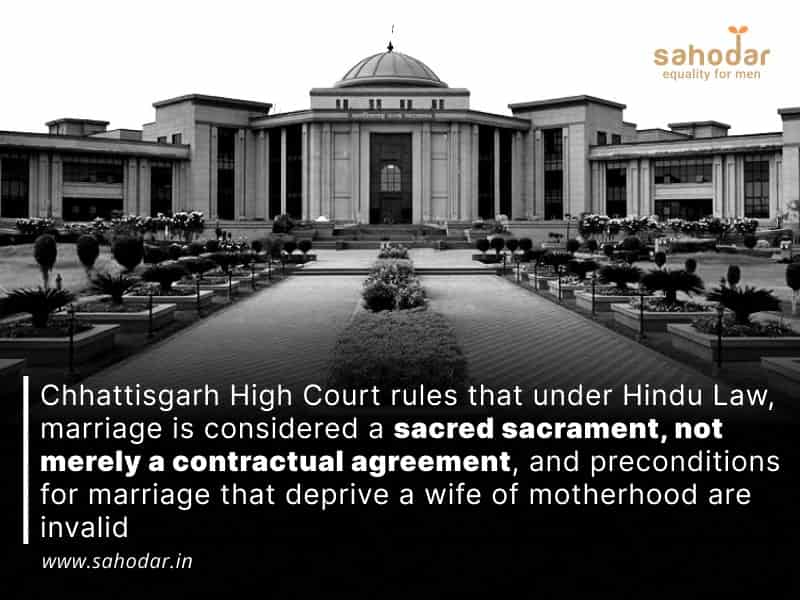In a recent ruling, the Chhattisgarh High Court has declared that it is not legally permissible to impose a pre-condition on marriage that deprives the wife of the ability to have her own biological children. The court’s Division Bench comprising of Justice Goutam Bhaduri and Justice N.K. Chandravanshi stated that:
“To deprive a woman from motherhood as a pre-condition for marriage cannot be given a priority. The type of condition set forth by husband only adds gloomy atmosphere to a married life as against a cheer by a child. Therefore, a demand to have child by wife from husband cannot be constituted a cruelty.”
Contentions of Parties
The appellant-husband argued that he had agreed to a pre-condition for his second marriage that they would not have children since he was already a divorcee with a child from his previous marriage. However, the wife began mistreating his son and pressuring him to have a child. As a result of this situation, the husband eventually gave in to the pressure and consented to the IVF procedure to have a child.
Furthermore, it was argued that although the husband had agreed to an IVF pregnancy using his own sperm, the wife put undue pressure on him and, without informing him, became pregnant using an anonymous donor’s sperm instead. This action, it was argued, constitutes mental cruelty, particularly given the mistreatment of the husband’s child from his first marriage. As a result, the husband is entitled to a divorce decree.
Conversely, it was argued on behalf of the respondent-wife that the IVF treatment document clearly indicates that the husband had consented to the pregnancy using an anonymous donor’s sperm. Furthermore, it was pointed out that the husband did not raise any objections or complaints about undue pressure during the course of the treatment, either with authorities or family members. Therefore, it was argued that there was no evidence of any undue pressure.
It was argued that the fact that the husband had paid for the expensive IVF treatment clearly indicates that he had consented to the entire procedure. Furthermore, regarding the allegations of cruelty towards the husband’s son, it was argued that there was no evidence to support these claims.
Court’s Observations
The court noted that in Hinduism, marriage is considered a sacred sacrament and serves as a basis for social organization, as well as the foundation for important legal rights and obligations.
“The importance and imperative character of the institution of marriage needs no comment and in Hindu Law marriage is a Sanskar. Therefore, presumed contract as has been stated by the appellant/husband that the second marriage was performed on the condition that they would not have a child from the second marriage cannot be a barrier as a valid sacred promise, if not performed, will assume the character of cruelty.”
Furthermore, the court referred to the appellant’s cross-examination in which he admitted that his wife had quit her job after their marriage and became financially dependent on him. Based on this testimony, it was inferred that the husband had also paid for his wife’s medical expenses.
“Conduct of the parties further would show that after the wife got pregnant and it was detected that she had three embryos, out of it one was removed for which they travelled to Delhi to the experts. The husband also accompanied. This would also lead to show that he was the consenting party to the entire initiation which was at the behest of both the husband and wife,” the Court added.
The court also rejected the argument that the wife’s decision to become pregnant using an anonymous donor’s sperm constituted cruelty, despite the fact that the husband was capable of donating his own sperm. The court noted that both the husband and wife had agreed to the use of an anonymous donor’s sperm during the IVF treatment. As a result, the court did not agree that the wife’s conduct amounted to cruelty.
Furthermore, the court observed that the appellant’s son from his first marriage had not been examined in court. Therefore, the court held that the best evidence available to the appellant to prove the alleged mistreatment of the child by the respondent had been withheld. As a result, the court held that in the absence of any evidence, it was not possible to draw an inference of cruelty.
Accordingly, the appeal was dimissed.
Case Title: P. Venkat Rao v. Smt. P. Padmavati
Case No.: First Appeal (M) No. 138 of 2018
Date of Order: March 9, 2023
Counsel for the Appellant: Mr. Srinivas Rao, Advocate
Counsel for the Respondent: Mr. Shashank Thakur, Advocate
Source: https://www.livelaw.in/news-updates/chattisgarh-high-court-pre-condition-of-marriage-hindu-law-not-having-children-as-condition-for-marriage-unacceptable-224680

